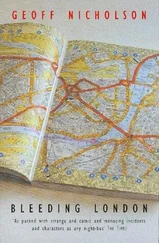It’s a long time coming, by which time a great many miles have been covered and a lot of time has passed, but eventually a big white car, a BMW, begins following Enlightenment, flashing its lights and sounding its horn to persuade Charles Lederer to pull over. This, of course, does not work, so the white car starts to overtake Enlightenment and as soon as it’s past, the driver brakes hard, forcing the Volkswagen to swerve and stop in a screech of brakes and tyres.
Barry’s position doesn’t allow him to observe much of what’s going on, but he can see the white BMW has no police markings and that the driver is a woman, not that he’s giving these things a lot of thought. There are other things on his mind. The moment Charles Lederer stops Enlightenment, Barry throws himself blindly off the car and lands, rather fortuitously, on a soft grass verge. It is such a relief to be detached from the car. He feels broken and his heart is still beating as though it wants to escape from his chest, but he feels better and more secure than he has for a long time.
Charles Lederer’s drive has been brought to a halt, but that doesn’t mean he’s ready to come quietly and let bygones be bygones. Despite the presence of the other car, he throws Enlightenment into reverse and tries to back up, with a view to subsequently driving forward and running Barry over as he recovers on the verge. But fate finally smiles on Barry. Enlightenment stalls, or rather Charles Lederer stalls it. There is a moment of hesitation, in which time the female driver has swiftly sprung out of her own car, approached the Volkswagen, ripped open the driver’s door and yanked the key out of the ignition and out of Charles Lederer’s grasp. Enlightenment is immobilised. Barry is saved. It is an act that required considered bravery and presence of mind, but perhaps one would expect nothing else from Detective Inspector Cheryl Bronte.
Barry scrambles to his feet and recognises his saviour. “Thank God,” he says.
“I said I’d see you again, didn’t I Barry?”
“I believe you did!”
Cheryl Bronte takes an unwarranted pleasure in being proved right on this point, but then she turns to Charles Lederer and says, “Is this your car, sir?”
“You know it’s my car,” says Barry.
“Can’t the gentleman answer for himself?” and then she looks inside the car and sees that he can’t. Charles Lederer is slumped over the steering wheel, exhausted, spent and quite incapable of speech. So Barry says, “Don’t worry, I can explain everything.”
Cheryl Bronte looks at him with a pained expression, as though she’s far from sure that she wants to have everything explained, but Barry has an unstoppable need to tell his story, and he does so. The story takes a considerable amount of time to unfold, and only some of it is of immediate interest to Cheryl Bronte. However, she does prick up her ears when Barry tells her that the old man in the Volkswagen is Charles Lederer, ex-Member of Parliament, father of late night weathergirl Marilyn Lederer, and the man most likely to be responsible for the spate of exploding Volkswagens. However, she still needs convincing of this last proposition.
“What makes you think he’s our man?” she asks.
Barry considers the question for a while and in the end can only say, “Well, that’s what his daughter told me.”
“I wonder why she told you that.”
“Maybe because it’s true.”
“I think we’d better all go and have a word with this daughter of his,” says Cheryl Bronte.
That suits Barry very nicely. Charles Lederer is decidedly reluctant to move, but he is eventually lifted into the back seat of Cheryl Bronte’s car. They head back to Carlton Bax’s gentleman’s residence, with Charles Lederer maintaining a profound and mournful silence for the entire journey.
Charles Lederer has driven a long way and it’s some time before they arrive at the house. The metal security gate is open, but that doesn’t surprise them so very much. There’s no sign of neo-Nazi Volkswagens, but then they would have no reason to expect them. Neither is there any sign of Marilyn but it takes some time before they realise that.
Cheryl Bronte drives in through the open gate and parks. She sees the tyre tracks that have carved up the lawns and flowerbeds, then she sees the smashed French windows through which Barry made his original exit. She does not look best pleased.
“I can explain all this too,” says Barry.
“Not now,” says Cheryl Bronte. “Please not now.”
She goes to the front door, finds it open and cautiously steps inside. Barry and Charles Lederer follow her in. There is no sound in the house, and no human presence. All three of them sense that something’s terribly wrong here. They look into the first room they come to, Carlton’s study. It is in a state of chaos. Drawers have been pulled out of desks, cabinets and glass cases have been smashed, displays torn from the walls, furniture has been overturned and cushions slashed open. The room has not been so much ransacked as completely demolished. And as they move on they see that the whole house has received similar treatment; floorboards have been lifted, and in places even the wallpaper has been scraped off. Something demonically thorough and systematic has been at work.
“Do you know what’s going on here?” Barry asks.
“Do you?” Cheryl Bronte asks in return.
“Well of course not,” says Barry. “Is it a burglary, or what?”
“What do you think?”
“I don’t know anything, do I?”
“I don’t know what you don’t know, Barry. But I think this was only a burglary in a very specialised sense of the word. I think whoever did this was looking for something very specific.”
“Like what?”
“I don’t know, but I’d be surprised if it wasn’t a Volkswagen in some shape or form.”
“And do you think they found it?”
Cheryl Bronte offers nothing but a shrug. At her side Charles Lederer looks around him at the mess and destruction of all the Volkswagen parts and models and badges, and although he still says nothing, his face looks quite satisfied by the spectacle. Then Barry panics. “What about Marilyn?” he demands. Again Cheryl Bronte says nothing so he runs madly from room to room, calling Marilyn’s name, searching for her amid the debris; but he doesn’t really expect to find her. He knows she has gone.
It is in the bathroom, where the shower has been wrenched from the wall, where tiles have been smashed and towels torn to ribbons, that he at last sees the message that tells him what he feared most. The message has been written on the wall-sized mirror in shocking pink lipstick and it says, “We took Carlton Bax. We’ve taken Marilyn Lederer. When we get what we want you can have them back.”
Barry calls to Cheryl Bronte who comes running, reads the message then nods sadly as though this is exactly what she has been expecting all along. “Who is that message addressed to?” Barry asks but by now he has learned not to expect a reply. Charles Lederer then arrives in the bathroom and having read the words begins to weep.
“You stupid old bugger,” Barry yells. “If you hadn’t spent half the night trying to kill me, we could have been here to protect Marilyn. Don’t you see, we were on the same side all along.”
Cheryl Bronte is unimpressed by this. “There’s nothing more you can do here,” she says to Barry. “Leave this to me. Just go home.”
“And what about him?”
Charles Lederer is now sobbing his heart out, shivering, shaking, making a deep bovine noise.
“Why don’t you take him with you?”
Charles Lederer opens his mouth and lets out a blood-chilling wail of epic, mythical proportions, and suddenly all the mania and the anger are stripped from him, and Barry can suddenly see him as a kind of tragic hero, as a fond and foolish father, as a flawed human being, worthy of pity and compassion, as Oedipus, as King Lear.
Читать дальше












